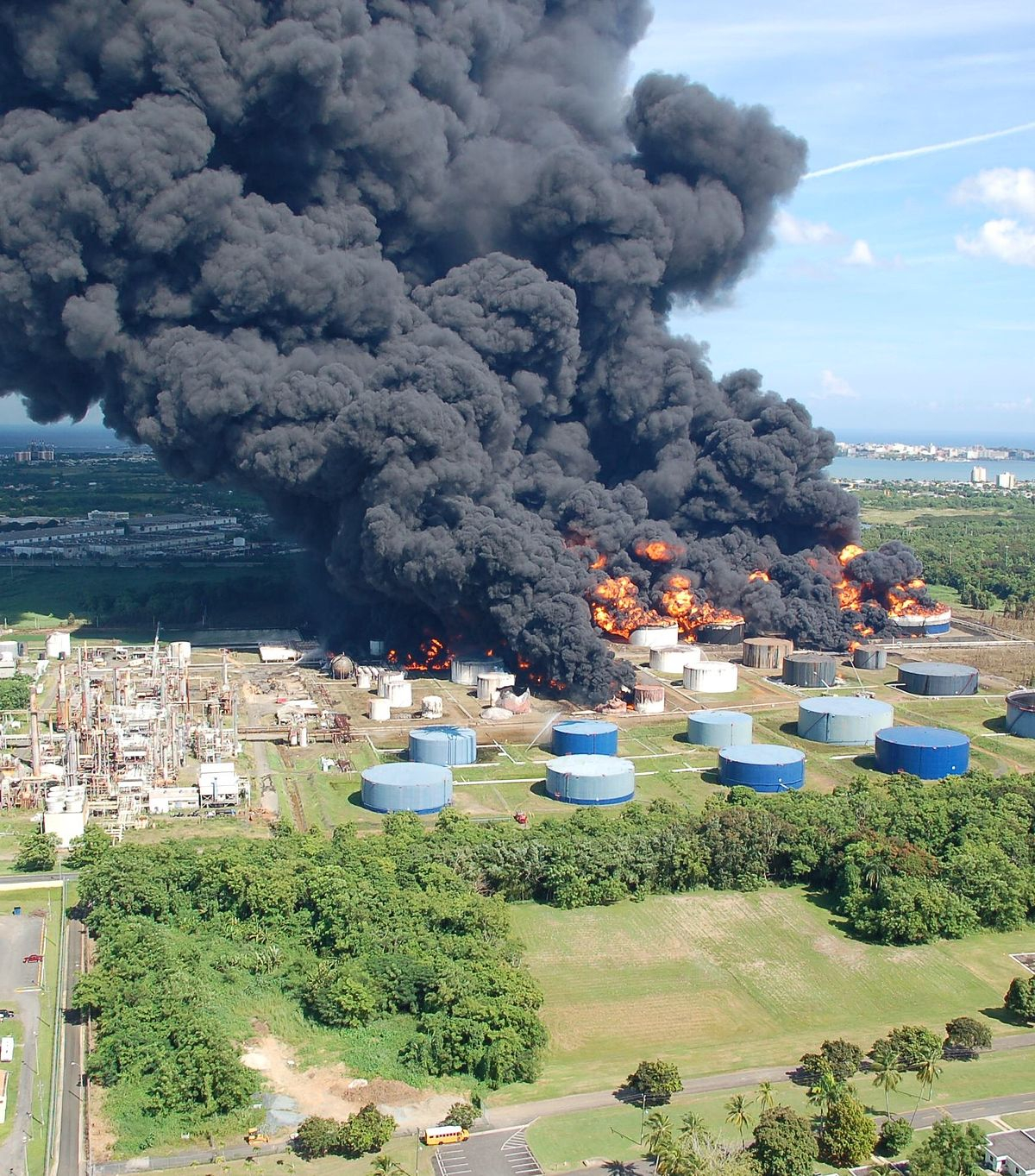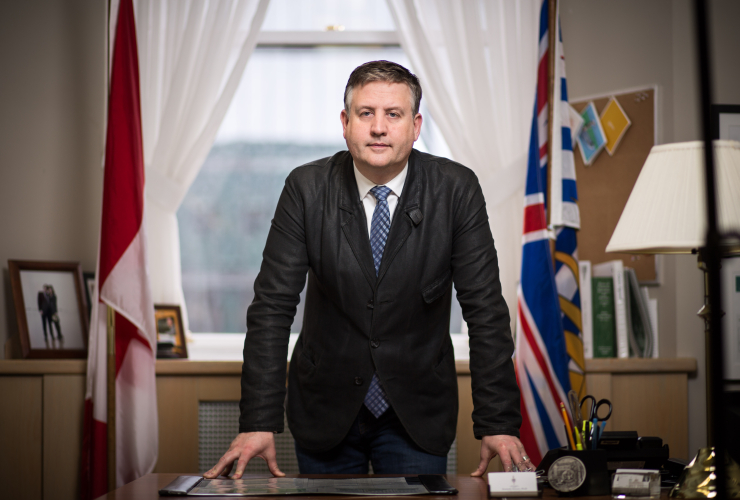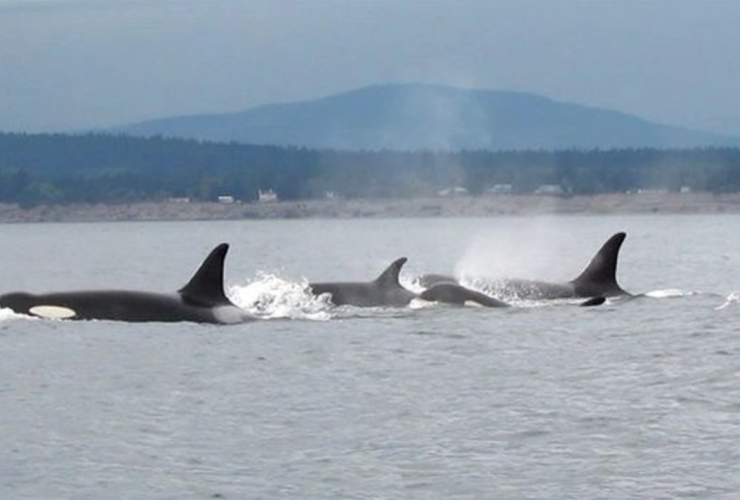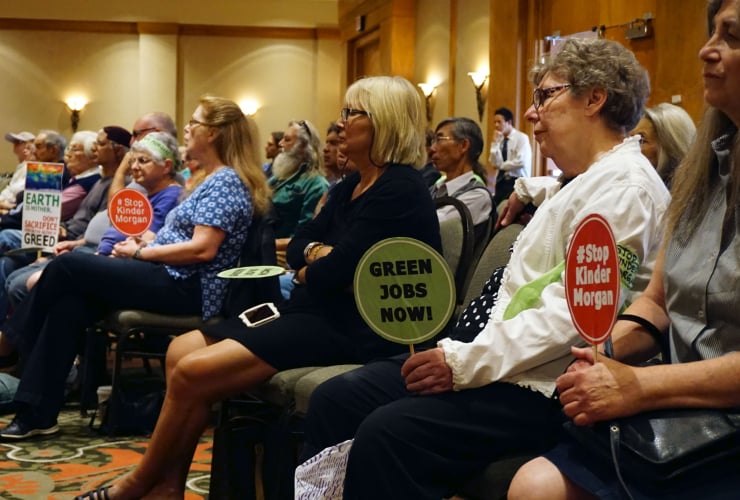Grayson Barke can’t get the images out of his mind — flames and black smoke boiling into the sky above oil storage tank disasters. They’re from Venezuela, Puerto Rico and England, all within the last dozen years.
“If you want some sense of what we’re scared of, look at these,” he says.

Barke and his wife Lauren own a condo steps away from Simon Fraser University in Burnaby, B.C., a picturesque mountaintop location surrounded by protected forest with one exceptional standout.
A dozen massive tanks filled with crude oil sit halfway down the mountain, immediately below the only roads out of the growing community called UniverCity where they live with about 5,000 others.
Click here to watch a video summarizing the risks
A Kinder Morgan Canada spokesperson says the storage tanks, officially known as the Burnaby Terminal, have operated without a fire for 60 years. Firefighters did, however, put out a small brush fire near the tank farm in 2016.
If Kinder Morgan’s Trans Mountain pipeline expansion begins construction this fall as planned, it will add 14 new, larger tanks for a total of 26 on Burnaby Mountain. It’s part of the company’s $7.4 billion-project to twin its existing pipeline for 90 per cent of the route from Edmonton to the shores of Burrard Inlet in Metro Vancouver.
The line will take a new route through heavily populated areas of B.C.’s Lower Mainland and in particular Burnaby, immediately east of Vancouver. In the current plan, the pipeline expansion line would leave the tank farm via a tunnel through Burnaby Mountain.
Barke has been shaken by a 2015 report from the City of Burnaby fire department about the potential hazards for an expanded tank farm. It concluded that closer spacing between tanks on the post-expansion site would make it easier for fire to spread if human error or a natural disaster such as an earthquake set off a blaze.
“Public officials are telling me that this is unsafe,” says Barke, a student in SFU’s resource and environmental management program. “When the fire department tells us the community might be a dangerous place because of the project, that’s supposed to be OK?”
The City of Burnaby's Fire Department completed a tactical risk analysis of the Trans Mountain tank farm in 2015.
Battle against expansion continues
The City of Burnaby’s position on the tank farm is that it’s not satisfied with the company’s response to the potential for disaster so close to homes and schools. It’s still fighting the pipeline project with everything at its disposal, including staff dedicated to helping residents have their say.
A potential seven-fold increase in the number of oil tankers taking diluted bitumen from the pipeline through Vancouver’s port and into the Salish Sea has been the most high-profile target of pipeline opponents. The wider issue of promoting continued oil sands production — and related greenhouse gas emissions — runs a close second. Local issues surrounding the transportation and storage of bitumen have largely flown under the radar, but are getting revived attention as the start of construction nears and the province is in the midst of a tight election campaign.
Concern about the tank farm centres on its hillside location in an earthquake zone — as is all of Metro Vancouver — with a university of 30,000 students and staff above it and older neighbourhoods of single-family homes and townhouses below. A disaster could release oil flowing downhill or rising noxious smoke from a fire.

Ali Hounsell, a spokesperson for the expansion project, says it is "designed in a way that’s deemed to be safe for the community." That’s because it gained approval from the National Energy Board (NEB) in 2016, subject to 157 environmental, financial, and technical conditions.
“That was very well explored through the regulatory process,” she says.
The design has since been adjusted to add more space between the tanks and the company has a fire suppression plan for the site, Hounsell adds.
In March, the Houston, Tex., branch of Genesis Oil and Gas Consulting Ltd. submitted its updated risk assessment of the tank farm expansion to the NEB to satisfy one of the regulator's conditions of approving the pipeline project.
It concluded the risk of injury to individuals living downhill from the tank farm or driving on the road above it is within acceptable limits, about one in a million per year. The consultant’s report rates the risk of individual injury at Simon Fraser even lower, at one chance in 10 million per year, adding that areas facing the highest possible danger are within the Burnaby Terminal property itself.
That judgment is based on on guidelines created in 1995 by the Major Industrial Accidents Council of Canada.
The latest controversy in the area involves Kinder Morgan’s requirement to alert landowners directly affected by the new line that they can file a statement of opposition with the NEB. Burnaby Mayor Derek Corrigan wrote an open letter to residents April 18 saying that only landowners whose properties will be crossed are getting formal letters, but a much wider swath of land will be affected and those citizens should submit statements, too.
The city offered to guide people thought the complex and often-confusing process of sending a statement to the NEB. It also asked for an extension to the deadline to respond — a moving target set at 30 days after the last public ad announcing the consultation.
On Tuesday, NEB chairman Peter Watson issued an update recognizing that some residents have had trouble using its system and agreed to continue accepting submissions.
“The NEB is committed to accommodating anyone who’s having difficulty filing their statements, and encourages anyone intending on filing a statement to do so as soon as possible,” he wrote.
Genesis found in its terminal expansion risk assessment report of Burnaby (prepared for the National Energy Board) that areas facing the highest possible danger are within the Burnaby Terminal property itself.
Effects reach beyond tank farm, critics say
Ann Jarrell is an opponent of the pipeline expansion who says she’s felt dizzy and ill as she drove by the tank farm to her condo at UniverCity. She blames fumes from the petroleum products stored in them.
She and others like her are more worried about what will be stored in the much larger tank farm if it’s completed by 2019 as proposed by the company: bitumen from Fort McMurray that’s been diluted with lighter hydrocarbons in order to flow. These diluents are usually natural gas condensates, liquids that readily release vapours containing volatile organic compounds — or VOCs — including benzene, a known human carcinogen.
“It’s an accident waiting to happen,” says Jarrell. “I worry we could be trapped up here for days with no way out of the fumes and smoke.”
The issue has spilled into the campaign leading up to a May 9 provincial election as voters in the riding of Burnaby-Lougheed size up the candidates in a potentially tight race. Both the New Democratic Party and Green candidates oppose the expansion project, while the Liberal candidate paints it as a done deal, now that the province’s demands for a financial share and safety guarantees have been met.
The riding was held by single-term NDP MLA Jane Shin who beat her Liberal opponent by only 743 votes in 2013 and then declined to run again. Now local school trustee Katrina Chen hopes to win for the NDP, but she’s up against Liberal Steve Darling, a high-profile former B.C. morning man for Global TV.
The Green Party’s Joe Keithley has an unusual backstory: he’s the former frontman for 1980’s punk rock band D.O.A. and he grew up two blocks from the tank farm.
Anti-pipeline voters worry their position might be split between the Greens and the NDP. But a more pressing issue is that voters are told they must choose between jobs and the environment, says Bob Hackett, a professor of communications at SFU who opposes the pipeline. That’s simply false, he adds.
“That jobs-environment dichotomy — as if we have to choose between one or the other — is absolutely fundamental to political discourse in B.C. And unless we overcome that, the environment will always lose.”
“There’s a way around it through an alternative path to development because that’s the bigger picture,” says Hackett. “When you start to reframe the ideas of green jobs being construction of public transit or retrofitting of buildings to meet energy standards and construction of new buildings that meet those standards, those are all green jobs and there are thousands of them.”
Supporters of the expanded pipeline place their hopes in the company’s estimate of 15,000 jobs during construction and double that in spin-off development once it’s running.

Unions take a shot at company
A labour coalition recently took out full-page ads in Vancouver’s daily newspapers telling Kinder Morgan to keep its promises on job creation. A related online campaign called Safety Before Profits launched in late April says workers are “concerned about Kinder Morgan's level of commitment to safety, rigorous training for their workers, and upholding B.C.'s Five Conditions.”
The five conditions set by B.C. Premier Christy Clark before giving the province’s go-head to the Trans Mountain project in January are: a fair share of revenue (B.C. will get $20 million to $50 million annually over 20 years); guarantees of adequate spill prevention and response; consultation with First Nations and passing all environmental reviews.
The labour-sponsored website, safetybeforeprofits.ca, says “Kinder Morgan refuses to partner with the most experienced and skilled workers to build the Trans Mountain pipeline,” and that could reduce safety during construction. It also suggests jobs will go to foreign workers, but provides no details.
A spokesman for the coalition founded by unions for labourers, operating engineers, teamsters and piping trades did not respond to a request from National Observer for an interview.
Trans Mountain spokesperson Hounsell says the company stands by its pledge to the province and has signed an agreement committing to a B.C.-first policy that gives qualified and competitive companies the first chance at jobs and contracts within the province.
“We have always been clear that our priority is to provide local benefits, including jobs for local and aboriginal communities wherever practical. We remain committed to that,” Hounsell says.
She says all preparations are full steam ahead while the company continues to look for partners to take a joint-venture position in the project. The company also issued a draft prospectus last week in preparation for an initial public offering (IPO), a way of seeking outside investors.
She said no firm deadline has been set for a final investment decision that will mark a commitment to begin construction.
As the pipeline saga continues, Burnaby residents like retired teacher Mary Hatch say she’s received an education she never wanted. It started for her in 2007 when a backhoe driver working on a sewer line accidentally smashed into the existing Trans Mountain pipeline about 200 metres from her door. The resulting gusher spewed about 250,000 litres of crude oil, some of it flowing into Burrard Inlet, and cost $15-million to clean up.
“It shattered my sense of security in this neighbourhood,” says Hatch now. “I didn’t know there was a pipeline on this road until it happened. No over ever talked about it in my neighbourhood. Ever.”
Burnaby has an out-sized share of petroleum infrastructure: pipelines, shipping terminals storage and refining sites dating to the 1930s, but does not have an obvious industrial atmosphere.
“It looks lovely out here on the inlet,” Hatch says. “You’re not that aware of it unless you really get into it. It’s depressing to think about. But if people do think about it and get a bit of education, they get very concerned.”
David Huntley, a retired physics professor at SFU, lives near the proposed pipeline tunnel through Burnaby Mountain and has been active in opposing the expansion from its announcement in 2012. While neighbourhood problems trouble him, it’s the bigger picture that keeps him writing letters to the editor and submissions to regulators.
“My biggest concern is the effect on climate change. That’s what’s really important.” says Huntley, from a sunny deck with a view that goes for miles. “The pipeline’s not going to be built because there are a lot of people like me who are willing to go to jail to stop it.”








Comments